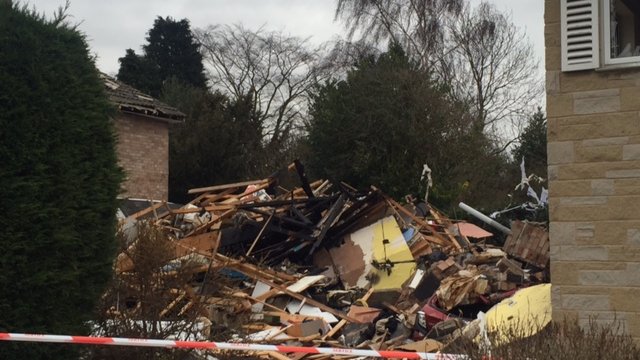Inquest Rules Accidental Death Over Haxby House Explosion
11 April 2017, 14:21 | Updated: 11 April 2017, 14:23

A man who died in a gas explosion may not have been able to smell the fumes that could have filled his home in just an hour, an inquest has heard.
Paul Wilmott, 63, was killed when his house in York was completely demolished by the blast in February last year.
An inquest heard that the explosion was caused by the fracture of a corroded gas pipe that was buried in the concrete floor of Mr Wilmott's 1970s-built house.
Steve Critchlow, a gas engineer and investigator for the Health and Safety Laboratory, told the inquest in York that the fracture had happened recently and there was no evidence gas was leaking for a significant amount of time.
He said: "I would imagine that probably an hour, maximum, would be enough to create this sort of incident.''
He added: "The house was pretty much full of gas.''
Mr Critchlow said the explosion, which happened at around 7.30am on February 19 2016, could have been caused by an electrical switch, such as a light switch or kettle, igniting the leaking gas.
He said: "In these sort of events, people often wonder why no-one in the house smelt gas.
"It's not untypical for gas to build up in the night and not notice it in the morning. That's because you are breathing it during the night and become desensitised to the smell.''
Mr Wilmott's body was found beneath rubble at the back of the house.
He died as a result of multiple fractures of the skull and injuries to the brain consistent with having been sustained in a domestic explosion.
The two-day inquest previously heard that the copper pipe in Mr Wilmott's house ran through two concrete slabs, subjecting it to tension for the entirety of its life as the slabs moved independently of each other.
It corroded and fractured at the point the slabs met in a doorway.
The jury was told that the corrosion could have been caused by a number of factors, including moisture, ammonia-based chemicals, or formic acid produced by an ants' nest found in a wall nearby.
Mr Critchlow, who investigated the explosion for the Health and Safety Executive, said: "This was a natural gas incident, a very unfortunate one, one that probably could not have been foreseen, and caused by failure of the pipe, due partially to corrosion but partially, and more so, to movement of the floor in which it was buried.''
He said Mr Wilmott's house was a typical construction of its time and had not been built to modern standards, meaning the gas pipe was unprotected from corrosion.
He said he had observed that other houses on Springwood, in Haxby, had gas pipes located externally, which he said had possibly been installed subsequently to the homes being built.
The jury returned a conclusion of accidental death.
The spokeswoman said: "Paul Wilmott died at 8.06am on 19 February 2016 at 20 Springwood, Haxby, due to injuries sustained as a result of a gas explosion, causing the house to collapse.
"The explosion was caused by stress corrosion fracture of a gas pipe embedded within the floor of the house.''






